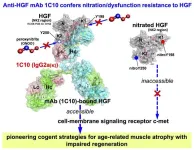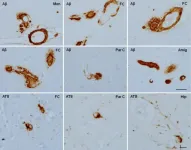(Press-News.org) Cognitive neuroscientists in Trinity College Dublin have published new research describing a brand new approach to making habit change achievable and lasting.
This innovative framework has the potential to significantly improve approaches to personal development, as well as the clinical treatment of compulsive disorders (for example obsessive compulsive disorder, addiction, and eating disorders).
The research was led by Dr Eike Buabang, Postdoctoral Research Fellow in the lab of Professor Claire Gillan in the School of Psychology and has been published as a paper, Leveraging cognitive neuroscience for making and breaking real-world habits, in the journal Trends in Cognitive Sciences.
Dr Buabang explains: “Habits play a central role in our daily lives, from making that first cup of coffee in the morning, to the route we take to work, and the routine we follow to prepare for bed. Our research reveals why these automatic behaviours are so powerful – and how we can harness our brain's mechanisms to change them. We bring together decades of research from laboratory studies as well as research from real-world settings to get a picture of how habits work in the human brain.”
Our habits are shaped by two brain systems – one that triggers automatic responses to familiar cues and another that enables goal-directed control. So for example, scrolling through social media when you are bored is the result of automatic response system, and putting your phone away to focus on work is enabled by the goal-directed control brain system.
It is precisely the imbalance between these two brain systems that is key. The research found that such imbalance can lead to everyday action slips such as inadvertently entering an old password instead of the current one. In more extreme cases, Professor Gillan’s research has shown that it can even contribute to compulsive behaviours seen in conditions such as obsessive compulsive disorder, substance use disorders, and eating disorders.
Habits happen when automatic responses outweigh our ability to consciously control them. Good and bad habits are two sides of the same coin—both arise when automatic responses overpower goal-directed control. By understanding this dynamic, we can start to use it to our own advantage, to both make and break habits.
The new framework describes several factors that can influence the balance between automatic responses and goal-directed control:
Repetition and reinforcement are essential to making our habits stick. Repeating a behaviour builds strong associations between environmental cues and responses, while rewarding the behaviour makes it more likely to be repeated. In leveraging the same mechanism to break habits, we can replace old behaviours with new ones to create competing automatic responses.
The environment also plays a key role in habit change. Adjusting your surroundings can help; making desired behaviours easier to access encourages good habits, while removing cues that trigger unwanted behaviour disrupts bad habits.
Knowing how to engage your own goal-directed system can help strengthen and weaken habits. Disengaging from effortful control, such as listening to a podcast while exercising, accelerates habit formation. However, stress, time pressure, and fatigue can trigger a return to old patterns, so staying mindful and intentional is key when trying to break them.
Dr Buabang explains, “Our research provides a new ‘playbook’ for behaviour change by connecting brain science with practical, real-world applications. We include effective strategies like implementation intentions, so-called, if-then plans ("if situation X occurs, then I will do Y"), and also integrate clinical interventions such as exposure therapy, habit reversal therapy, contingency management, and brain stimulation. It is important that our framework not only captures existing interventions but also provides targets for the development of new ones.”
This research also opens new possibilities for personalising treatments based on how different people form and break habits, making interventions more effective. Professor Gillan explains “We are all different; depending on your neurobiology, it might make more sense to focus on avoiding cues than reducing stress or allowing yourself more time for your daily routine”. Beyond individual treatment, these insights could reshape public health strategies. Understanding the brain's role in habit formation could help policymakers design more effective health campaigns, from encouraging regular exercise to reducing sugar consumption.
“By working with, rather than against, how our brains naturally form habits, we can create strategies that make healthier choices more automatic at both individual and societal levels.”
END
Researchers discover new cognitive blueprint for making and breaking habits
2024-11-19
ELSE PRESS RELEASES FROM THIS DATE:
In a small international trial, novel oral medication muvalaplin lowered Lp(a)
2024-11-19
Research Highlights:
The oral medication muvalaplin may safely lower high levels of lipoprotein(a), also known as Lp(a), an independent, inherited risk factor for cardiovascular disease.
Muvalaplin is a small molecule inhibitor that prevents the bonding of the two protein components that combine to make Lp(a). There are no currently FDA-approved medications to lower Lp(a) levels, though other medications are currently being evaluated in clinical trials. Muvalaplin is the first oral medication developed to lower Lp(a) levels.
Results ...
Eradivir’s EV25 therapeutic proven to reduce advanced-stage influenza viral loads faster, more thoroughly in preclinical studies than current therapies
2024-11-19
WEST LAFAYETTE, Ind. — Eradivir, a preclinical biotech company, has developed a patent-pending antiviral therapeutic that reduces lung viral loads of advanced-stage influenza in preclinical studies quicker and more effectively than currently available therapies.
A single intranasal dose of EV25, a bispecific small molecule developed by Eradivir, acts faster than the current standard of care, eliminating the detectable virus within 24 hours. EV25 also has a window of efficacy of 96 hours postinfection, which is broader than the current standard of care.
A ...
Most Medicare beneficiaries do not compare prescription drug plans – and may be sticking with bad plans
2024-11-19
Every fall, millions of Medicare beneficiaries have the chance to pick a new stand-alone prescription drug plan that may be better suited for them, but most stick with the same plan.
A new study published today in Health Affairs Scholar suggests that 52% of Medicare beneficiaries with stand-alone Part D plans did not switch because they made no plan comparisons at all for 2024. Many of these beneficiaries (41%) also reported not knowing how to switch plans.
“Comparing these Medicare Part D plans is hard, so many beneficiaries just don’t do it. But beneficiaries who don’t compare plans may not notice if they are sticking with more expensive plans or ...
“What Would They Say?” video wins second place in international award for tobacco control advocacy
2024-11-19
DALLAS, Nov. 19, 2024 —“What Would They Say?” – the powerful spoken word poem produced on video by the American Heart Association, which is celebrating 100 years of lifesaving service as the world’s leading voluntary organization focused on heart and brain health, has taken second place in the 4th Annual Anthem Awards winning the Silver Award in the Education, Art & Culture Campaign - Non-Profit Community Engagement category. This international recognition celebrates the Association’s impactful work and historic commitment ...
Black Britons from top backgrounds up to three times more likely to be downwardly mobile
2024-11-19
Even when their parents are lawyers, doctors, or executives, Black Britons are substantially more likely to end up in working class jobs than their White peers, a new study from the University of Kent reveals.
Funded by the Leverhulme Trust, this research shows that Black men from the most advantaged families are three times more likely than White men from similar backgrounds to be in working class jobs beyond age 30. Black women are also twice as likely as White women to experience this kind of downward mobility. This is true even after removing ...
Developing an antibody to combat age-related muscle atrophy
2024-11-19
Fukuoka, Japan—We all age. And while humanity’s life expectancy has increased dramatically in the modern era, we still struggle with the inevitable health issues our bodies face as we get up in the years. For example, the decrease of muscle mass and function, leading to weakness and atrophy. This is a pressing concern in a super-aging society like Japan where—while people live longer—without proper muscle strength, quality of life can be drastically diminished.
In findings that may eventually lead to targeted ...
Brain aging and Alzheimer's: Insights from non-human primates
2024-11-19
“Brain aging is a biological process that comprehends degenerative, adaptive, and regenerative brain changes that elapse through maturity until the elderly.”
BUFFALO, NY- November 19, 2024 – A new review was published in Aging (listed by MEDLINE/PubMed as "Aging (Albany NY)" and "Aging-US" by Web of Science), on October 29, 2024, Volume 16, Issue 20, titled, ”Brain aging and Alzheimer’s disease, a perspective from non-human primates.“
In the review, Ferrer Isidro from the University of Barcelona and Reial Acadèmia de Medicina de Catalunya, explores the differences in ...
Can cells ‘learn’ like brains?
2024-11-19
Individual cells appear capable of learning, a behaviour once deemed exclusive to animals with brains and complex nervous systems, according to the findings of a new study led by researchers at the Centre for Genomic Regulation (CRG) in Barcelona and Harvard Medical School in Boston.
The findings, published today in the journal Current Biology, could represent an important shift in how we view the fundamental units of life.
“Rather than following pre-programmed genetic instructions, cells are elevated to entities equipped ...
How cells get used to the familiar
2024-11-19
A dog learns to sit on command, a person hears and eventually tunes out the hum of a washing machine while reading … The capacity to learn and adapt is central to evolution and, indeed, survival.
Habituation — adaptation’s less-glamorous sibling — involves the lessening response to a stimulus after repeated exposure. Think the need for a third espresso to maintain the same level of concentration you once achieved with a single shot.
Up until recently, habituation — a simple form of learning — was deemed ...
Seemingly “broken” genes in coronaviruses may be essential for viral survival
2024-11-19
Viruses are lean, mean, infection machines. Their genomes are tiny, usually limited to a handful of absolutely essential genes, and they shed extra genomic deadweight extremely fast.
Usually.
Coronaviruses, including SARS-CoV-2 (the virus that causes COVID-19), appear at first glance to be an exception. They have some extra “accessory” genes in addition to the usual minimal viral set, and scientists don’t know what most of them do. Scientists believe these extra genes must be doing something important, though, or they would be rapidly lost as the viruses evolved.
Now, University of Utah Health researchers have found that some of these viral genes have stuck around ...




